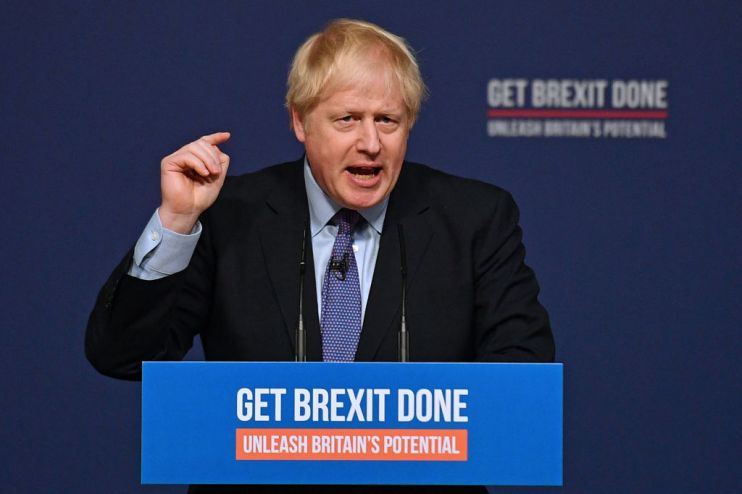General Election: Boris Johnson promises to ‘forge a new Britain’ post-Brexit

Boris Johnson has promised a “pent-up tidal wave of investment” post-Brexit at today’s Conservative manifesto launch in order to “forge a new Britain”.
The Prime Minister launched the party’s manifesto today in the marginal constituency of Telford, which promised £23bn of increased public spending and tax cuts.
However, Johnson’s speech itself focussed heavily on the need to leave the EU by January, with few new policy announcements.
The speech’s key announcement was a promise to train 50,000 new nurses, along with a commitment to create 50m more GP appointments.
He also pledged to build “hundreds of thousands of new homes” on brownfield sites across the UK.
Read more: General Election: Conservatives surge in latest polling
Much of the 15-speech concentrated on his “get Brexit done” messaging.
“We believe after three-and-a-half years it is time to unleash the potential of the whole country and forge a new Britain,” he said.
“Get Brexit done and we’ll see a pent-up tidal wave of investment into this country.”
Johnson attacked his opponents throughout the speech and warned of a “Corbyn-Sturgeon coalition of chaos”.
He said: “Do you want to wake on up November 13 and find a Nightmare on Downing Street?
“I say let’s go Carbon-neutral by 2050 and Corbyn-neutral by Christmas.”
He also made several quips about Corbyn’s announcement on Friday that he would remain neutral on Brexit.
Johnson joked: “He used to be indecisive – now he’s not so sure.”
The Tories have promised to spend £100bn on new infrastructure, including building a “Northern Powerhouse Rail” between Leeds and Manchester and upgrading railways connecting the Midlands.
The Prime Minister confirmed an earlier announcement to ensure a “triple tax lock” on VAT, income tax and national insurance, while also restating a pledge to cut business rates and for the UK to reach net-zero Co2 emissions by 2050.
The policy document also details £1bn in additional funding for social care every year, a £3bn National Skills Fund to retrain adults and doubling tax fraud prison sentences to a maximum of 14 years.
Many of the manifesto’s headline policies had already been announced, such as recruiting 20,000 new police officers, implementing an Australian-style points immigration system and a £34bn increase in NHS spending.
Responding to the launch, Jeremy Corbyn said it was a “manifesto for billionaires”.
“After a decade of the Conservatives cutting our NHS, police and schools, all Boris Johnson is offering is more of the same: more cuts, more failure, and years more of Brexit uncertainty,” he said.
“Older people face a triple whammy as he has failed to protect free TV licences for over 75s, refused to grant justice to women unfairly affected by the increase in the state pension age, and not offered a plan or extra money to fix the social care crisis.”
Matthew Lesh, head of research at free market think tank the Adam Smith Institute, welcomed the “robust” manifesto, but criticised the party for scrapping a previously planned corporate tax cut.
“The Conservatives should be congratulated for a robust manifesto that lowers national insurance, seeks to revise business rates, and commits to not increasing income tax.
“However, cancelling the planned corporate tax reduction will discourage investment and job creation and will make it harder to unleash Britain’s potential.”
Today’s launch was in stark contrast to Labour’s on Thursday, which came with a raft of new spending policies and commitments.
Even today, Labour still managed to outspend the Tories by announcing a last-minute £58bn policy to compensate all women born between 1950 and 1960.
An estimated 3.7m women born between 1950 and 1960, who planned on retiring at 60 before the state pension age was increased, will receive £100 per week of income lost.
The average woman will receive £15,000, while some will receive more than £31,000.
Shadow chancellor John McDonnell said the change in the state pension rules was a “historic injustice” and that some women affected were “suffering real hardship”.
McDonnell added that the £58bn cost – spread out to £11.5bn a year over five years – would be funded by borrowing.
Steve Webb, director of policy at insurance firm Royal London, said this meant the cost will be borne by the next generation.
Read more: Boris Johnson promises a ‘triple-tax lock’ as Labour pledges another £58bn
“If its paid for by borrowing, then it means that the next generation will have to pay for it,” he said.
“We’re saying that ‘we’re using your dime to pay for it’, and it seems unfair as they will already have to pay a lot of taxes in the future as this generation gets older.”